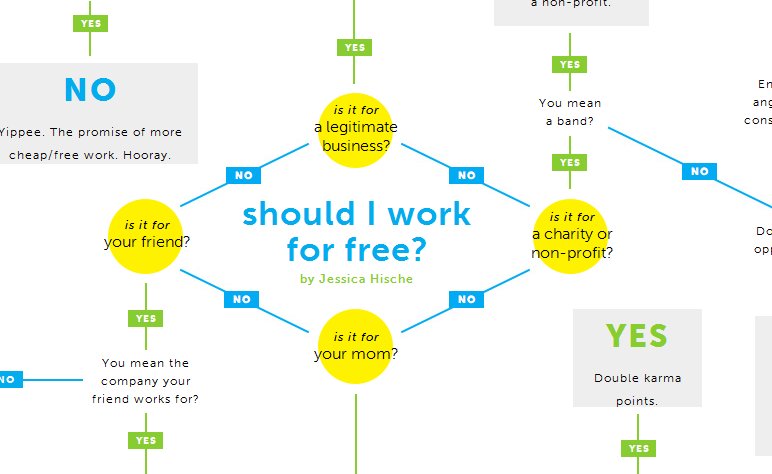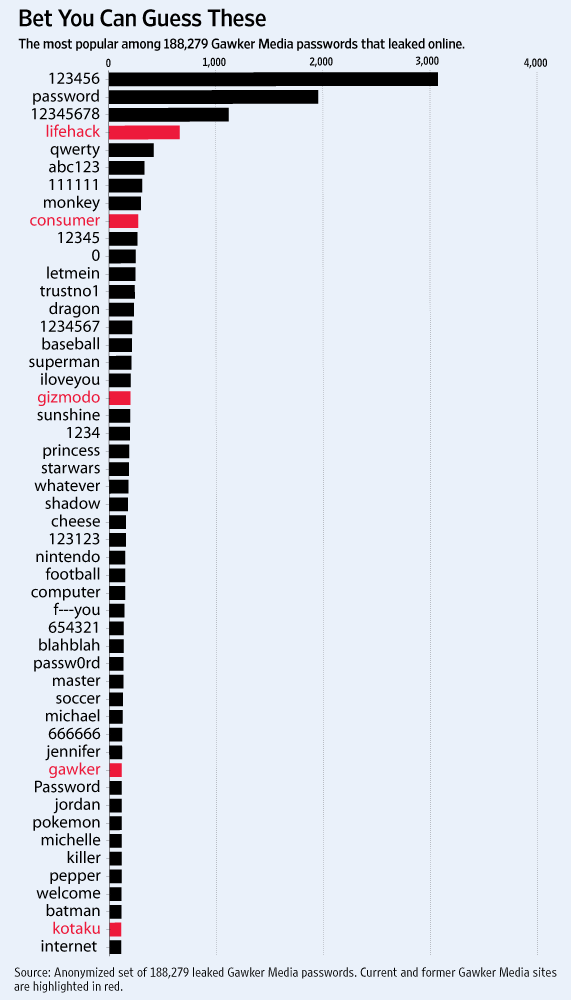Do watch both videos. One shows the app in operation, the other shows how it works.
January 23, 2011
January 21, 2011
Have you ever asked yourself if you should work for free?
If so, Jessica Hische can help you figure out the appropriate response:

Click to see full image (NSFW language)
H/T to Tim Harford for the link.
January 18, 2011
The Elder Gods will not be mocked
Oh, wait. Yes, they will:
H.P. Lovecraft’s elder god Cthulhu is supposed to be terrifying, hideous and awe-inspiring—but whoever knew he could be this darn cute? Check out 14 toys that take a slimy monster and turn it cuddly.
Cthulhu My Little Pony
Cthulhu Christmas Wreath
H/T to John Kovalic for the link.
January 16, 2011
Hey, aspiring fiction writers! Don’t enter this contest!
John Scalzi does you a big favour by pointing out how insane you’d need to be to want to enter this writing contest:
. . . from an outfit called First One Digital Publishing. Why? Because it costs $149 to enter, and because of this little gem in the contest fine print:
All submissions become sole property of Sponsor and will not be acknowledged or returned. By submitting an entry, all entrants grant Sponsor the absolute and unconditional right and authority to copy, edit, publish, promote, broadcast, or otherwise use, in whole or in part, their entries, in perpetuity, in any manner without further permission, notice or compensation. Entries that contain copyrighted material must include a release from the copyright holder.
So, to be clear: These people want you to sign away all the rights you have to your own work — and they want you to pay them to do it. That’s just very special.
You pay them to enter. You sign away all your rights to the work you submit (they can do whatever they like with it, including publishing it themselves). They agree to judge your work, but do not guarantee that any prizes will actually be awarded. Oh, and in submitting your piece, you also agree that you have no legal claim against them. Just breathtaking in its audacity.
January 13, 2011
January 11, 2011
Footage of flash flooding in Queensland
You can donate to the flood relief effort at http://www.qld.gov.au/floods/donate.html.
H/T to BoingBoing for the link.
Update: The Guardian is reporting at least nine people are dead, with many more missing:
Floodwaters are now heading for Brisbane where the river, which runs through the centre of the city, has broken its banks and police have urged local residents to begin evacuations.
Police described the wall of water that swept through the city of Toowoomba, west of Brisbane, as an “inland instant tsunami”. Cars were tossed like toys down the street, trees uprooted and businesses inundated as the floodwaters tore through the centre of town. Four people including two children were killed.
“Houses were ripped from their stumps. This is unbelievable damage,” said the Toowoomba mayor, Peter Taylor.
From Toowoomba, the water flowed down the Lockyer valley where emergency services plucked more than 40 people from houses isolated by the torrent, which hit with little warning. Thunderstorms and driving rain were keeping helicopters from reaching people still in danger this morning.
Update, the second: My friend and occasional contributor of blogging material Roger Henry is in the Brisbane area and reports on local conditions:
It has been raining all day with a prolonged thunder-storm. West of here it has been raining at an average 6 inches an hour since early this morning. All bets against a major flood are now off. Ipswich looks like it might go underwater. Caboolture, to our north, flooded so fast that residents were fleeing on foot with no clear idea of where to go (Uphill?).
The four-lane highway north is now a 20 mile long parking lot as the cops try to get traffic turned around. That should be fun.
Stocked up on batteries, candles, tinned food and some extra gas cylinders for the little stove. Water is not an issue:-)
We were assured, by experts, that the rain would stop this morning. The opposite seems to have occurred and now they are hoping tomorrow might be fine.
Ooops. Emergency services have just issued a continuing severe weather alert for the next twelve hours.
The problem is not confined to here. Bad weather has spread into
northern New South Wales, and several rivers there are now in flood.Getting very interesting.
January 6, 2011
QotD: The “information elite”
I noticed in the mid-nineties the new buzzword was “the Information Elite,” a proposed new class that included, by definition, anyone in the media, no matter how low-level or rote/mechanical in their actual job function. And you know who couldn’t get enough of talking about the “Information Elite?” The media, of course! Because everytime they brought it up, and fretted about this new class distinction that might have harmful effects for sooociiiiety, they were of course flattering themselves by naming themselves “the Elite.”
While pretending to worry about this new class, of course they were all delighting inside. Who wouldn’t? The dirty little secret is that pretty much anyone wants to be “elite” in some way or another. So any cute new catchphrase putting you into some new elite is going to be, well, a little attractive.
Anyway, that’s how class distinctions harden, I’m pretty sure, at the lower levels of the class, among the more marginal/aspirational members of the purported class, because they want the class to exist, because they need for it it to exist — in order for them to belong to it.
The low-level line producer at MSNBC needs the fiction of the “Information Elite” as a class a hell of a lot more than, say, Steven Spielberg does. Steven Spielberg doesn’t really have to worry about his status or position in the pecking order. He has enough individual accomplishments that he has no need to inflate his ego with the accomplishments of other people, to whom he is connected only by his purported class.
Ace, “The Illusion of the “Professional” Class and the Rise of the Liberal Aristocracy”, Ace of Spades HQ, 2011-01-06
Orders of magnitude, US dollar version
Page Tutor provides a very useful visual reference to the terms Million, Billion, and Trillion:

Believe it or not, this next little pile is $1 million dollars (100 packets of $10,000). You could stuff that into a grocery bag and walk around with it.
H/T to Tim Harford for the link.
December 29, 2010
December 25, 2010
Merry Christmas!
Among my gifts this year, I received the H.L. Mencken collection Prejudices, so I’ve got lots to read over the next few days.
I also received the “Yes, Minister” and “Yes, Prime Minister” DVD collections, although getting a chance to play them will probably not come up for a few days, given how many other DVDs were exchanged as gifts this year.
I hope your Christmas (if you celebrate it) was equally happy.
Now, turn off your browser and go enjoy yourself offline!
December 23, 2010
Some interesting links
A few links to follow at your leisure, as they’re not in any sense time-critical:
- What happens when men make Christmas cookies.
- Eric S. Raymond provides a preliminary Taxonomy of haterboys.
- Police said alcohol apparently played a big role. Apparently so.
- The porn productivity hack.
- On second thought, let’s not go to Portland. It is a silly place.
- Mister DNA (commenting on a post at The Agitator): Nothing captures the essence of Rock & Roll like singing, “Obey Authority”.
- Just to add a touch of the surreal, British Airways reverse-hijacks their own passengers.
December 17, 2010
Gay and lesbian couples’ income levels
As this article asserts, I don’t remember where I heard the “fact” that gay couples had higher incomes than heterosexual couples, but it seemed likely to be true. Apparently not:
The myth of gay money holds that “gays” (really just gay males) are high-income or rich. Why? Mostly because they don’t have kids, especially not when two guys live together. (That would make them DINKs.)
This myth was relentlessly propagated through the 1990s and persists today. Maybe you couldn’t put your finger on where you heard it (perhaps in a newspaper article?), but the stereotype is out there. And it isn’t true.
[. . .]
Why do gay males have generally lower incomes than straight males?
- Gay males have more education than straight males, but they do not choose male-dominated professions as often as straight males do. In fact, they choose female-dominated and/or service professions much more often. Male-dominated professions (like construction) have generally higher wages than female-dominated professions (like secretarial).
- Gay males work fewer hours than straight males.
Why do lesbians generally have higher income than straight females? It’s almost the inverse of the gay-male trend.
- Lesbians also have more education than straight females, but they work longer hours — because, generally speaking, they are less likely to have children to take care of at home.
- Lesbians are overrepresented in male-dominated professions that pay better than female-dominated professions.
What about discrimination? It’s a ready excuse to explain away the “few” gays who don’t meet the stereotype of being affluent. (That’s what press coverage would tell you – that just a few of us aren’t affluent. In reality, it’s most of us.) But the statistical evidence for discrimination as a cause of lower gay incomes is weak at best, and of course falls down completely in the case of lesbians, who, most studies agree, have higher incomes than straight females. Discrimination is clearly a factor sometimes; it just isn’t a credible explanation for the whole effect, which doesn’t apply to half of the population we’re talking about.
H/T to Freakonomics blog for the link.
December 16, 2010
Wine pricing: the trade-off between quality and prestige
I haven’t actually listened to the Freakonomics podcast on whether expensive wines taste better, but I suspect the answer will be “no”.
I’ve been interested in wines for quite some time now, but I’ve found something that caps the amount of money I’m willing to pay for a bottle of wine to well under $100. Either my palate is insufficiently developed to taste the differences between a $40 wine and a $90 wine, or there really isn’t that much difference.
For most people, most of the time, once you get above the bargain-basement level of wine, you can usually find good, flavourful wine for between $15 and $20. What you may not be able to find is a wine in that price range that will impress your date or your guests. If you’re trying to impress, price will have to be one of the most important part of your decision: fewer people will be as impressed by your really good bargain as will be impressed by the big ticket bottle of “Chateau de Fancy French Name” . . . even if they taste the same.
Believe it or not, the most dominant flavor may be the dollars. Thanks to the work of some intrepid and wine-obsessed economists (yes, there is an American Association of Wine Economists), we are starting to gain a new understanding of the relationship between wine, critics and consumers.
One of these researchers is Robin Goldstein, whose paper detailing more than 6,000 blind tastings reaches the conclusion that “individuals who are unaware of the price do not derive more enjoyment from more expensive wine.”
So why do we pay so much attention to critics and connoisseurs who tell us otherwise?
That’s the question we set out to answer in this podcast.
December 15, 2010
That’s not an elaborate Christmas display. This is an elaborate Christmas display
PC World says:
Turner calls the game “Snowball Blaster.” If you help Santa dodge all the snowballs, you get a special lights display. Passers-by can hop into the “blaster” unit and use a controller to play via a PC that operates 128-channels of lights to form the display.
December 14, 2010
No surprises at all in Gawker’s 50 most-popular passwords
An article in the Wall Street Journal has the 50 most popular passwords from the Gawker data heist:

Recognize the pattern? Here’s a word cloud from my last post on passwords:

Other posts on this topic: Passwords and the average user, More on passwords, And yet more on passwords, and Practically speaking, the end is in sight for passwords.





